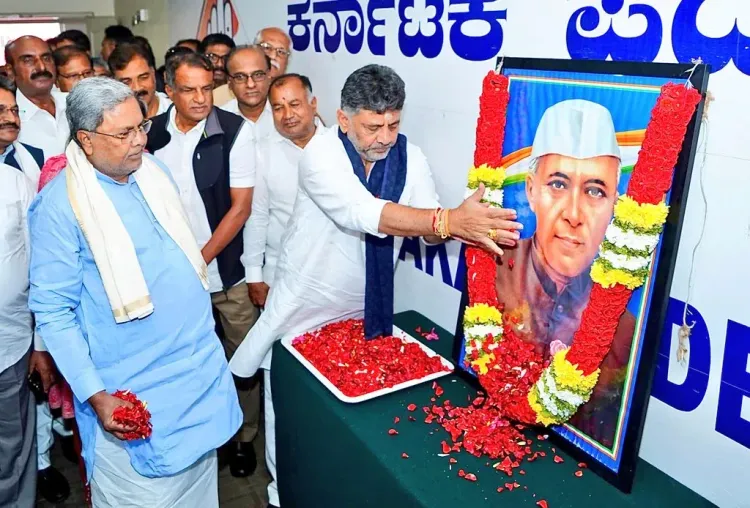What Was Nehru's Impact on India's Independence and Nation-Building?

Synopsis
Key Takeaways
- Nehru was pivotal in India's independence and nation-building.
- The Green Revolution transformed India's agricultural landscape.
- His policies laid the groundwork for India's current economic status.
- Criticism of Nehru often overlooks his significant contributions.
- Political discourse today continues to shape perceptions of his legacy.
Bengaluru, May 27 (NationPress) The Karnataka Congress unit commemorated India's inaugural Prime Minister, Pandit Jawaharlal Nehru, with floral tributes at the party office, reflecting on his significant contributions to nation-building.
Chief Minister Siddaramaiah remarked, "The imprint of Pandit Nehru in India's struggle for independence and nation-building is profound and cannot be erased. Today, India stands as the fifth-largest economy globally, a testament to the groundwork laid by Nehru. With vast knowledge and education, he established a robust foundation for modern India."
Highlighting Nehru's societal contributions, Siddaramaiah noted that the leader willingly contributed his family's wealth for the progress of the nation, guiding every sector towards advancement.
Alongside the Green Revolution and initiatives for food security, Nehru was instrumental in the evolution of science and technology, he emphasized.
Siddaramaiah criticized the RSS and BJP, claiming these organizations did not partake in the freedom movement and instead supported British rule. "Their current patriotic rhetoric is nothing but hypocrisy," he stated.
He also mentioned, "Ambedkar himself noted that Dange and Veer Savarkar were behind his electoral defeat. Yet, BJP and RSS propagate falsehoods that the Congress was responsible for it."
Deputy Chief Minister and KPCC President D.K. Shivakumar added, "Nehru was among the most remarkable leaders in our history. His tenure laid the groundwork for the nation through the Green Revolution, Industrial Revolution, and Educational Revolution, upon which our country is built."
He asserted, "Without Nehru, there is no India. Our state exemplifies this—entities like BHEL, ITI, HAL, ISRO, and BEML were founded by Nehru. His foresight in Bengaluru was remarkable even back then."
Shivakumar continued, "Today, when we discuss the Constitution and Dr. B.R. Ambedkar, it was Nehru who recognized Ambedkar's talents and appointed him as Law Minister. Nehru resonated with people from all walks of life. Our Constitution, national flag, and Five-Year Plans are the pillars of this nation. Nehru transformed India from a food-deficient country to one that is self-sufficient in food production through the Green Revolution, Industrial Revolution, and Educational Revolution."
He emphasized, "Regardless of the criticisms from the BJP, we must highlight these truths. Let us discuss our contributions versus theirs. Under former PM Manmohan Singh, the Congress government introduced the Right to Education, Right to Information, Right to Food, Employment Guarantee Act, and amendments to the Forest Rights Act."
Shivakumar concluded, "Former PM Indira Gandhi empowered farmers through land reforms, providing land to the tillers. It was the Congress government that enacted laws to bolster the working class. Nehru prioritized states and initiated India's aviation sector and major irrigation projects. We are constructing our nation upon the foundation he established. Apart from KGF, any other industries or public enterprises in our state exist due to Nehru's visionary outlook."









